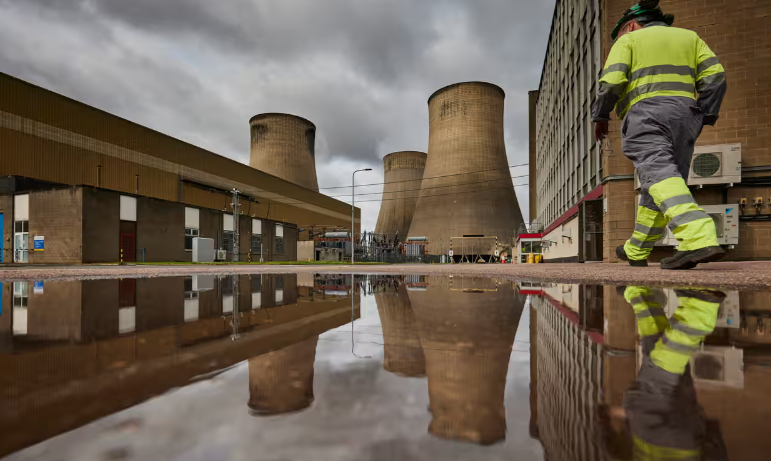UK Marks Historic Shift as Last Coal-Fired Power Plant Shuts Down, Raising Questions About Future Energy Stability

In a landmark decision, the Ratcliffe-on-Soar power plant, located over 100 miles north of London, will officially cease operations today, marking the end of Britain’s reliance on coal for electricity generation.
This closure signifies a significant transition for a country historically recognized as the birthplace of coal-fired power, having first harnessed this resource during the Industrial Revolution over a century ago.
For many years, coal was the backbone of Britain’s energy landscape, powering factories, locomotives, and homes. At its peak in the early 1990s, coal-fired power stations accounted for over 75% of the nation’s electricity. However, the UK has been rapidly moving away from coal, with coal providing a mere 1.3% of electricity last year. The transition has been largely attributed to increasing renewable energy sources, particularly wind power, and a commitment to reduce greenhouse gas emissions.
Despite the environmental progress represented by this transition, there are growing concerns about the potential risks involved in this significant shift. As the UK phases out coal, the government faces challenges in ensuring energy stability and affordability. Energy prices have already risen, and the manufacturing sector has experienced a notable decline. The upcoming deadline set by the Labour government aims for a carbon-neutral power system by 2030, a goal that experts have warned may not be achievable without significant investment in new infrastructure and technology.
Currently, Britain’s electricity grid lacks the necessary capacity to support a more extensive use of renewable energy sources like wind and solar. Most existing high-voltage power lines are still connected to traditional coal and gas power plants, which could leave the grid vulnerable during periods of low energy production. Furthermore, the technology required to effectively store renewable energy remains in its infancy, creating additional uncertainty for future energy supply.
The closure of the Ratcliffe plant, which has operated for 57 years, is seen by many as a bittersweet milestone. While environmental advocates celebrate the end of coal, which is one of the largest contributors to greenhouse gas emissions, they also emphasize the importance of a just transition for workers affected by this change. Many employees at Ratcliffe have already been assisted in finding new roles, but the long-term implications of this transition for the broader workforce remain to be seen.
In the wake of the plant’s closure, Britain is poised to rely on two primary sources of energy: imported power from continental Europe and the Drax power station in Yorkshire, which has converted its operations to use wood pellets instead of coal. Although the government categorizes this biofuel as carbon-neutral, the environmental impact of burning wood pellets remains a subject of debate.
As Britain embarks on this unprecedented journey to eliminate coal from its energy mix, the success or failure of this experiment could set a precedent for other countries grappling with similar energy transitions. The UK’s experience will be closely monitored, particularly as nations around the world evaluate their strategies for reducing reliance on fossil fuels.
While the shift away from coal presents challenges, it also offers an opportunity for innovation in energy technologies. Developing reliable energy storage solutions and enhancing battery technology will be crucial in maintaining grid stability and meeting the country’s ambitious climate goals.
The New York Times, the Guardian, and BBC contributed to this report.








